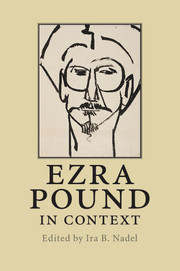Book contents
- Frontmatter
- Contents
- Notes on contributors
- Acknowledgements
- Chronology
- List of abbreviations and note on references to The Cantos
- Introduction
- Part I Biography and works
- 1 Prose criticism
- 2 Poetics
- 3 Translation
- 4 Romance languages
- 5 Letters
- 6 Editor, anthologist
- 7 Education
- 8 Journalism
- 9 Politics
- 10 Economics
- 11 Radio broadcasts
- 12 Law
- 13 Textual criticism
- 14 Archives
- 15 The Lives of Pound
- Part II Historical and cultural context
- Part III Critical reception
- Further reading
- Index
10 - Economics
Published online by Cambridge University Press: 05 July 2014
- Frontmatter
- Contents
- Notes on contributors
- Acknowledgements
- Chronology
- List of abbreviations and note on references to The Cantos
- Introduction
- Part I Biography and works
- 1 Prose criticism
- 2 Poetics
- 3 Translation
- 4 Romance languages
- 5 Letters
- 6 Editor, anthologist
- 7 Education
- 8 Journalism
- 9 Politics
- 10 Economics
- 11 Radio broadcasts
- 12 Law
- 13 Textual criticism
- 14 Archives
- 15 The Lives of Pound
- Part II Historical and cultural context
- Part III Critical reception
- Further reading
- Index
Summary
Ezra Pound's economic views first manifest themselves in the late years of World War I, when Pound was in his early thirties. There is no controversy about what led Pound to consider himself an apostle of economic reform. It was the arrival in 1917 of Clifford Hugh Douglas at the offices of The New Age. The New Age was a journal of arts and opinion edited by A. R. Orage, a Nietzschean, former Theosophist, and later Gurdjieffian apostle in New York city. Pound had been a regular contributor and a frequent denizen of its editorial offices since 1912. Orage allowed him to write on pretty much whatever interested him. The New Age was an important source of income for Pound, as well as a platform from which he could pronounce his views on art, politics, and religion.
Orage and his friend Holbrook Jackson had taken over The New Age in 1907 with financial assistance from wealthy Fabians – among them George Bernard Shaw. However, the journal was never an organ of Fabian opinion, aspiring to be open to all stripes of political and cultural opinion, specializing in “alternative” views on religion, politics, and economics. Although definitely a “little magazine,” it was not obscure. Frequent contributors included G. B. Shaw, H. G. Wells, Arnold Bennet, G. K. Chesterton, Hilaire Belloc, T. E. Hulme, Herbert Read, Katherine Mansfield, and Edwin Muir, as well as Pound.
Douglas was an industrial engineer, quite innocent of any training in economics. But while reorganizing the Royal Aircraft Works at Farnborough during the First World War, he made a startling discovery: the wages, salaries, dividends, and retained profit of the factory added up to a smaller sum than the aggregate price of the goods it produced – the aircraft. This is known as the A + B theorem. From this observation he drew the conclusion that it would be impossible for the workers, managers, and owners of any factory to purchase the product of that factory with their collective incomes. If this were true for one factory, it would be true for all.
- Type
- Chapter
- Information
- Ezra Pound in Context , pp. 106 - 114Publisher: Cambridge University PressPrint publication year: 2010
- 2
- Cited by

